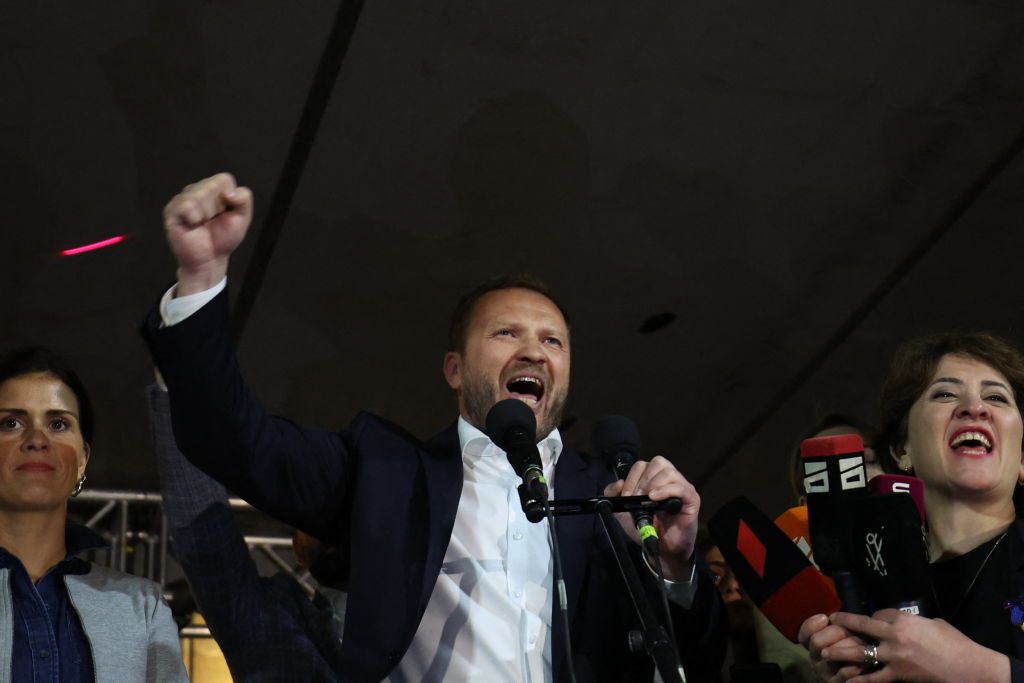require those who receive more than half of their funding from abroad to register as “foreign agents” and adhere to strict regulations. Critics argue that this law is an attempt to silence civil society organizations and media outlets critical of the government, while supporters claim it is necessary to promote transparency and prevent foreign influence in Georgian politics. The protests have been largely peaceful, but tensions escalated on May 13 when police used water cannons and rubber bullets to disperse the crowd. Several protesters and journalists were injured in the clashes, prompting widespread condemnation from human rights organizations and Western governments. The protests have also highlighted broader discontent with the ruling party’s perceived lack of progress in addressing corruption and economic challenges in the country. As tensions continue to rise, it remains to be seen how the government will respond to growing domestic and international pressure over the controversial law.
Supporters of the foreign agents law argue that it is necessary to prevent foreign interference in Georgia’s domestic affairs. They claim that some civil society organizations and media outlets receive significant funding from abroad, which can result in undue influence on the country’s political landscape. By requiring these organizations to register as “foreign agents” and disclose their funding sources, supporters believe that transparency can be increased and potential threats to national security can be mitigated. Additionally, they argue that the law is in line with similar legislation in other countries, such as the United States’ Foreign Agents Registration Act (FARA), which aims to monitor and regulate foreign lobbying activities.
Critics of the law, however, argue that it is a thinly veiled attempt to suppress dissent and stifle critical voices in Georgian society. They point to the government’s track record of cracking down on independent media and civil society organizations as evidence of its authoritarian tendencies. Critics also argue that the law’s vague and broad language could be used to target a wide range of individuals and organizations, including NGOs, media outlets, and political opposition groups. They claim that labeling these entities as “foreign agents” could harm their reputation and credibility, leading to self-censorship and a chilling effect on freedom of expression.
The passing of the foreign agents law has not only sparked domestic unrest but has also drawn international condemnation from Western governments and human rights organizations. The United States, European Union, and other Western allies have expressed concerns about the law’s potential impact on Georgia’s democratic institutions and civil society. U.S. Assistant Secretary of State Jim O’Brien warned Georgian officials that there would be consequences if the law is implemented in its current form, including possible financial and travel restrictions on individuals responsible for violent crackdowns on protesters. The European Union has also criticized the law and called for a reevaluation of Georgia’s commitment to democratic values and the rule of law.
The protests in Georgia have continued despite the passage of the foreign agents law, signaling widespread discontent with the ruling party and its policies. Protesters have called for the resignation of government officials, including Georgian Dream’s Honorary Chairman Bidzina Ivanishvili, who is seen as the de facto leader of the country. The demonstrations have brought together diverse groups, including opposition parties, civil society organizations, and ordinary citizens, in a united front against the government. The use of force by the police to disperse protesters on May 13 has further fueled anger and galvanized support for the protest movement. As tensions escalate, the government faces mounting pressure to address the grievances of its citizens and uphold democratic norms in the face of domestic and international scrutiny.
In response to the ongoing protests, Georgian President Salome Zourabichvili has vowed to veto the foreign agents law, sending it back to parliament for reconsideration. However, the ruling Georgian Dream party and its allies are likely to have enough votes to override the president’s veto and pass the law. As the political crisis deepens, the government will need to navigate a delicate balance between maintaining stability and addressing the legitimate concerns of its citizens. The international community will be closely monitoring developments in Georgia and may consider imposing sanctions or other measures if the government fails to uphold democratic principles and respect human rights. The outcome of this political standoff will have far-reaching implications for Georgia’s future trajectory and its standing in the international community. Support for independent journalism in Ukraine is crucial in the face of attempts to suppress dissent and restrict freedom of expression. By joining the fight for press freedom and democratic values, individuals can make a tangible impact in supporting the rights of journalists and upholding the principles of a free and open society. Your support will help ensure that independent journalists in Ukraine have the resources and protection they need to continue their vital work in the face of adversity. Stand with us in this critical moment and make a difference for the future of independent journalism in Ukraine.


